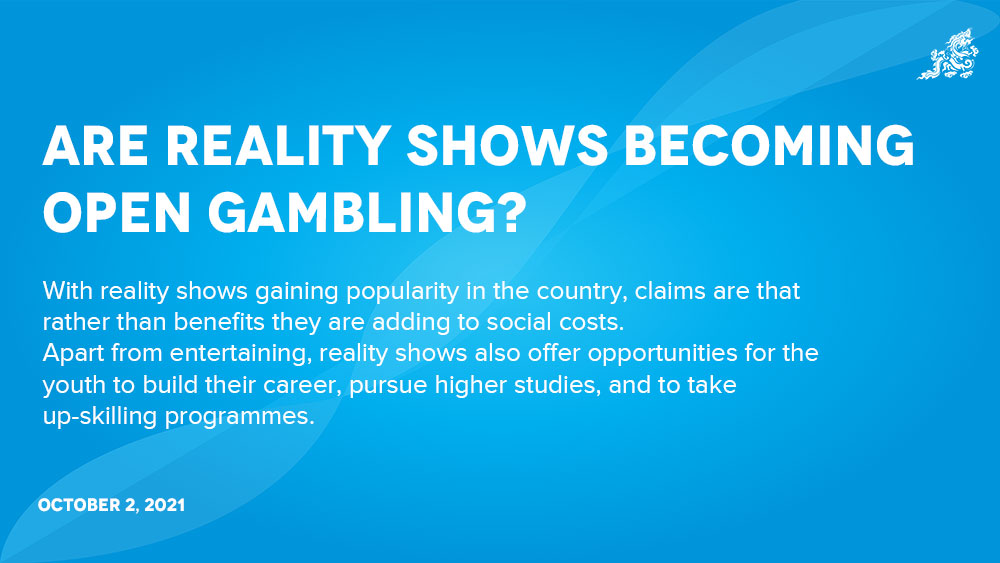Thukten Zangpo
With reality shows gaining popularity in the country, claims are that rather than benefits they are adding to social costs.
Apart from entertaining, reality shows also offer opportunities for the youth to build their career, pursue higher studies, and to take up-skilling programmes.
However, claims are that unlimited bulk voting through banking apps like Bank of Bhutan’s mBoB, Bhutan National Bank’s mPAY and Tashi Cell’s eTeeru, are breeding open gambling.
In reality shows, viewers can also vote for their favourite contestants through SMS voting from two telecom operators, Bhutan Telecom and TashiCell. A vote cost Nu 10.
The telecom operators and banks keep 20 percent share from the total votes; 80 percent goes to the organisers.
For a contestant to go to the next level, it is decided by 50 percent judges’ score and 50 percent public vote. However, the votes determine the contestants’ position rather than the judges’ score since there is only a minor difference in the score.
Contestants’ sometimes are found asset mortgaging and selling their property to buy votes.
One of the contestants of Voice of Bhutan (VoB), Tshering Wangchuk, said votes accounted for Nu 2.5M to 3M via mBoB and eTeeru just from his parents, relatives, friends and his close supporters.
He was eliminated after reaching the top seven.
“Money is equally important to win,” Tshering Wangchuk said.
One of the relatives of a 12-year-old girl contestant who contested in one of the reality shows, said that she spent Nu 150,000 in votes. The girl came third and won prize money of Nu 0.3M.
“I feel it was not worth it. She had to sacrifice most of her study time in preparation of songs,” she added.
VoB contestant, Om Pradhan, said the supporter mostly create groups on social media where contestants share their bank accounts number.
He said he has never provided his account number to anyone.
“Talent is becoming like a business. Those with money power have greater chances of winning,” Om Pradhan said.
Chenga Dawa, the winner of the VoB, said that he had supporters both from inside and abroad.
A VoB, Kinley Choki, said most of his supporters were from Australia and New York who even sent her money.
VoB organizer, Chencho Dorji, said the contestants sign a contract agreement prior to the show in presence of their parents, asking them not to ask for votes in public and pressurize parents for votes.
He said that in earlier shows there were rumours where people sold properties and availed loans for votes. “Such things have never happened in his show.”
Chencho Dorji said that the vote money share of 80 percent for organisers was to support prize money, hall charge, equipment, uniforms, grooming session for contestants and staff payment.
Chencho Dorji said in other countries channels buy programmes for the content but in Bhutan, the organizers have to pay BBS.
“If the BBS does not charge and other stakeholders cut down their charges, we could have a limit to voting,” Chencho Dorji said.
He said that in VoB season 4, the total investment was Nu 8M and they are expecting 15 percent profit from the show. He said the show gives opportunities to contestants for studies or jobs or necessary skills training after the show.
Organiser of Druk Gi Kalapingka, Kelzang Phuntsho, said they had a recent meeting with the BBS.
He said BBS objected to voting through banking but agreed to vote from the telecom operators and cap Nu 500 per individual to vote.
“It would not make a difference as people will resort to bulk recharge from the banking services like Eload and mBoB, mPAY to recharge vouchers to others and vote,” Kelzang Phuntsho said, adding that organizers never forced people to vote.
Director of Bhutan Infocomm and Media Authority (BICMA), Jigme Wangdi, through an email interview, said the authority has learnt that reality shows have been breeding social issues such as open gambling, exploitation, asset mortgaging to buy votes, regionalism, and risk of politicizing as a result of many group formations using different social media platforms.
The authority has not received any formal complaint as yet.
Jigme Wangdi added that the authority has no access earnings from the sponsors, including from voting systems and mobile bank transfer, and they issue letters to the two telecom operators for the release of money collected from the voting system upon verifying the receipt of prizes for each category as per their proposal.
“The issues are cross-sectoral which require the multi-sectoral approach to conduct a thorough study and come up with guidelines conducive for both the organisers and contestants,” he added.
Chief executive officer of BoB, Dorji Kadin, said as a service provider and facilitator, they give the platform and that if BICMA issues regulations on limited voting banks will adhere.
Officiating Director of the Department of Law and Order, Karma Dorji said the department recently received a letter of concern from BICMA but there was no concrete evidence to take interventions. “We are definitely going to take this matter up through consultation with relevant agencies because there are increasing talks about it. We have to acknowledge and recognize such issues brought to us.”
As per BICMA, the agency has given 21 television reality show permits from 2012 to date.
Edited by Tshering Palden


